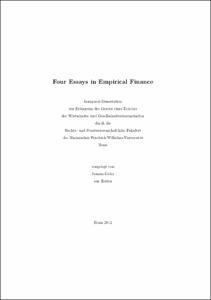Gider, Jasmin: Four Essays in Empirical Finance. - Bonn, 2012. - Dissertation, Rheinische Friedrich-Wilhelms-Universität Bonn.
Online-Ausgabe in bonndoc: https://nbn-resolving.org/urn:nbn:de:hbz:5-29819
Online-Ausgabe in bonndoc: https://nbn-resolving.org/urn:nbn:de:hbz:5-29819
@phdthesis{handle:20.500.11811/5253,
urn: https://nbn-resolving.org/urn:nbn:de:hbz:5-29819,
author = {{Jasmin Gider}},
title = {Four Essays in Empirical Finance},
school = {Rheinische Friedrich-Wilhelms-Universität Bonn},
year = 2012,
month = oct,
note = {In four self-contained essays, this thesis aims at empirically exploring phenomena which emerge as a result of the asymmetric information stemming from the separation of ownership and control. Chapter 1 deals with the traditional agency conflict topic. When investors fear that managers do not act in their best interest and fail to collectively organize and control managers appropriately, is there an opportunity for professional investors to step in and reduce agency cost? In particular, are the activities of hedge funds and private equity funds in the German equity market driven by the reduction of agency costs?
The remaining three chapters deal with a second implication of asymmetric information: the phenomenon of insider trading. Both Chapter 2 and Chapter 3 investigate the trading of so called 'corporate insiders'. Corporate insiders are individuals associated with the firm and having obvious access to private information about the firm, that is, high ranking managers, board members or larger shareholders. The U.S. regulator requires them to disclose their transactions. Both chapters explore the trading behavior of corporate insiders using data on transactions from the U.S. regulator, the Securities and Exchange Commission (SEC). Chapter 2 investigates whether corporate insiders exploit short-term information advantages. Chapter 3 deals with the interaction of regulation and corporate insider trading. The chapter analyzes whether corporate insiders exploit leeway in reporting their transactions.
Chapter 4 deals with a different dimension of insider trading. The analysis in this chapter focuses on illegal insider trading - the trading on material, non-public information in violation of Rule 10b-5 of the Securities and Exchange Act of 1934. Most developed countries prohibit trading on material, non-public information based on the premise that it harms other investors. Illegal trading is to be distinguished from 'legal' insider trades by corporate insiders which have to be registered with the SEC. Legal insider trades are disclosed to the public and are not necessarily based on material, non-public information. Chapter 4 investigates the extent to which the phenomenon of illegal insider trading responds to the detection and sanctioning of insider trading by the regulator.},
url = {https://hdl.handle.net/20.500.11811/5253}
}
urn: https://nbn-resolving.org/urn:nbn:de:hbz:5-29819,
author = {{Jasmin Gider}},
title = {Four Essays in Empirical Finance},
school = {Rheinische Friedrich-Wilhelms-Universität Bonn},
year = 2012,
month = oct,
note = {In four self-contained essays, this thesis aims at empirically exploring phenomena which emerge as a result of the asymmetric information stemming from the separation of ownership and control. Chapter 1 deals with the traditional agency conflict topic. When investors fear that managers do not act in their best interest and fail to collectively organize and control managers appropriately, is there an opportunity for professional investors to step in and reduce agency cost? In particular, are the activities of hedge funds and private equity funds in the German equity market driven by the reduction of agency costs?
The remaining three chapters deal with a second implication of asymmetric information: the phenomenon of insider trading. Both Chapter 2 and Chapter 3 investigate the trading of so called 'corporate insiders'. Corporate insiders are individuals associated with the firm and having obvious access to private information about the firm, that is, high ranking managers, board members or larger shareholders. The U.S. regulator requires them to disclose their transactions. Both chapters explore the trading behavior of corporate insiders using data on transactions from the U.S. regulator, the Securities and Exchange Commission (SEC). Chapter 2 investigates whether corporate insiders exploit short-term information advantages. Chapter 3 deals with the interaction of regulation and corporate insider trading. The chapter analyzes whether corporate insiders exploit leeway in reporting their transactions.
Chapter 4 deals with a different dimension of insider trading. The analysis in this chapter focuses on illegal insider trading - the trading on material, non-public information in violation of Rule 10b-5 of the Securities and Exchange Act of 1934. Most developed countries prohibit trading on material, non-public information based on the premise that it harms other investors. Illegal trading is to be distinguished from 'legal' insider trades by corporate insiders which have to be registered with the SEC. Legal insider trades are disclosed to the public and are not necessarily based on material, non-public information. Chapter 4 investigates the extent to which the phenomenon of illegal insider trading responds to the detection and sanctioning of insider trading by the regulator.},
url = {https://hdl.handle.net/20.500.11811/5253}
}






